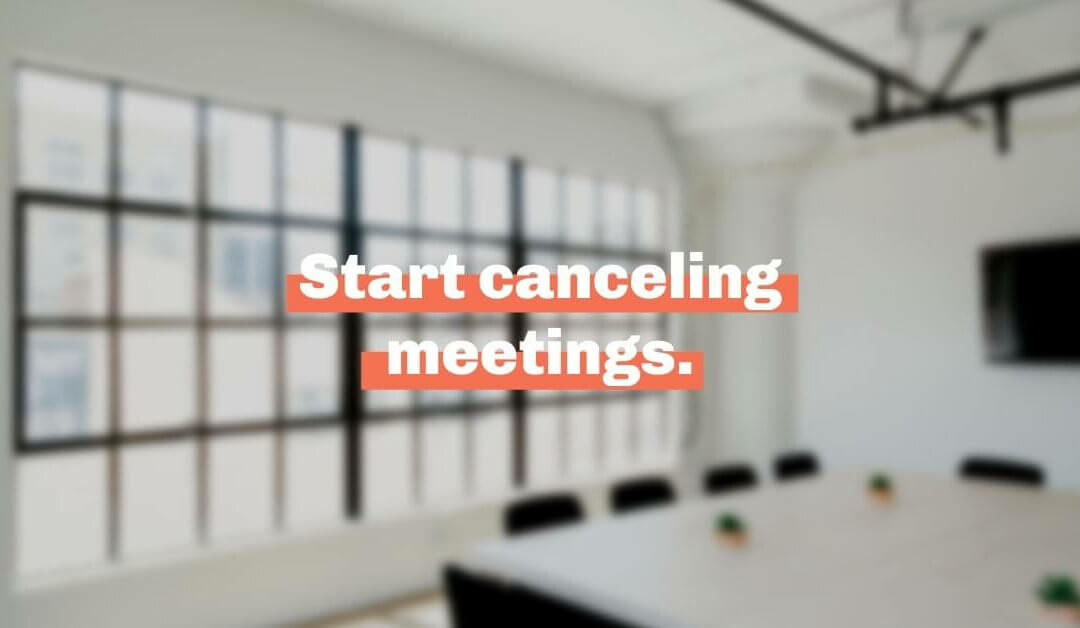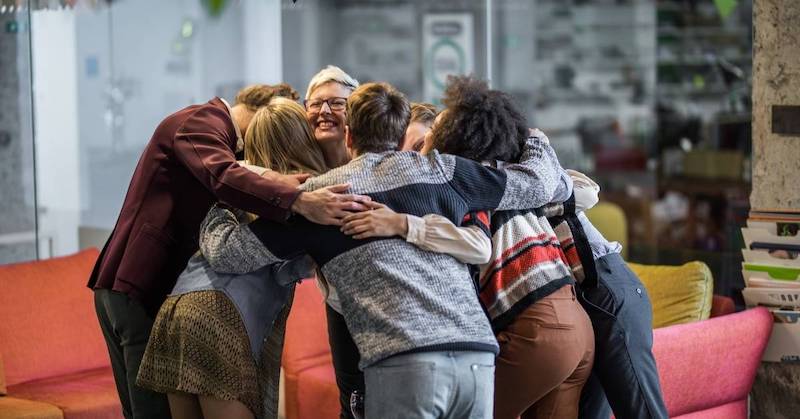
by Allison Kooser | Aug 20, 2021 | +Good Newsletter, The Intro
Looking for an easy way to make your team more productive, more creative, and (almost certainly) happier?
Start canceling meetings. Today.
If I can point to one practice that has helped me pivot from being a full-fledged workaholic to a person with a fair amount of margin in her day, it has been my willingness to ruthlessly eliminate meetings from my day.
By canceling 70% of my meetings, I have (magically) freed up my work week. I am sitting on an extra dozen hours of time to actually do work.
And I’m not alone.
As a recent Digiday article noted, “As more statistics link meeting overload to burnout, a crackdown on meeting culture is emerging.”
While canceling all of your meetings might not be possible, there are definitely small steps you can take to make your meetings more productive (and give your calendar a bit more breathing room).
Begin by asking the tough questions like…
What is this meeting costing your organization?
Do you have all of your senior leaders in a room for 2 hours? Think about what that time is worth…
What is the opportunity cost of this meeting?
What else could you be doing with this time—and is that something else more important?
Do you know exactly what you’re hoping to accomplish in the meeting?
Going into a meeting without a goal is a surefire way to waste time.
Are you prepared for the meeting?
Do you have notes? An agenda? Pre-reads? Do all of the attendees know what they’re supposed to bring to the table?
Can you make the meeting shorter?
Sure, canceling meetings might not be possible—but you can definitely save yourself some time by cutting an hour into 30 minutes, or 30 minutes into 15!
No agenda? Decline.
Is this really a simple question? Just send it to me and I’ll answer it. Do you need me to brainstorm? Great. Put pen to paper for a few minutes and I’ll start there.
Here at Swell+Good, our team works asynchronously (we do not have fixed business hours) which makes meetings nearly impossible and has forced us to double down on other forms of communication. We’re pros at messaging, written updates, and shared notes and files—and when we actually speak in real-time, it is much more about relationship building than getting things done.
With clients, we’re strategic. We come to meetings armed with questions, stick to our agendas, and keep meetings as short as possible—we’ll happily host a 5-minute update and call it a day (no need to fill 30 minutes if you don’t have 30 minutes of things to talk about!).
A no-meeting (or fewer-meetings) life is a beautiful thing. So open that calendar and start canceling.
Need help thinking through how to make your meetings more effective—or how to get rid of some of them altogether? Reach out by replying to this email! We’d love to help!

by Allison Kooser | Mar 25, 2021 | The Intro
When we look back over our professional (and personal) lives, we are struck by just how valuable our relationships have been.
There are the people we “officially” worked with for three months who are still valuable mentors to us years later. There are friends who listened to us complain about projects and helped us make difficult decisions about what to do next. There are colleagues we’ve worked alongside for decades and neighbors who might not ever know what a profound impact they have had on us.
Cultivating and maintaining these relationships matters.
You never know where a new connection might lead or when an old friend’s expertise is suddenly essential. (Our not-so-secret trick: stay connected to your former coworkers. It’s the best and expands your social capital…a lot.)
What are you doing to invest in your relationships this week? Who have you been meaning to email or call recently? Who deserves a big pile of gratitude?
Why not drop them a note right now?

Because like it or not, we are shaped and guided by the people around us.
Our lives are better because of the people who have crossed our paths. And our guess is that you would say the same. So let’s keep relationships at the top of our priority list. Yes, because they help us. And yes, because they can be valuable. But mostly because people are awesome and special and absolutely worth celebrating.

by Allison Kooser | Mar 18, 2021 | The Intro
We all know that the first few weeks at a new job are critical — both for you and your team.
How do you build relationships with your new colleagues? What tools and systems do you need to learn? How can you set yourself up for ongoing collaboration, creativity, productivity, and success?
But what do you do at the end of a season? How do you leave a job well?
How you say goodbye is just as important as how you say hello.

For the person leaving, saying a good goodbye means equipping your team with the information, skills, and tools they need to be successful after your departure (we’ve touched on some practical steps before — things like passwords, file access, logins, links, handbooks, trainings, and more…). It means taking the time to close a season, even as you’re anticipating your next move.
For the rest of the team, goodbyes often mean more work — and certainly more headaches. But it’s our job to say goodbye well, too.
We believe in caring about our colleagues as people, so when a team member heads to a new project or venture, we want to be excited for them! We send them off with encouragement, enthusiasm, and the assurance that their relationships are still as strong as ever.
We also ask questions. Lots of them. Because every transition is an opportunity to learn — for the person leaving, of course, but also for everyone who sticks around.

by Allison Kooser | Mar 11, 2021 | The Intro
Think about a colleague or a member of your team (or a friend…that works too).
What do you appreciate about them? What are their secret skills? What project or assignment or initiative have they knocked out of the park recently? What makes them especially awesome?
Chances are, this is a pretty simple exercise. We work with rockstars and it’s easy to think about what makes them so special.
Here’s the harder question: When was the last time you told them what’s in your head right now? When was the last time you sat down to articulate thoughtful, specific praise to your team?
Friends, those shout-outs matter.
Giving praise is worth the effort.

We all need reminding that we are good at our jobs — and it always feels good to know that we’re appreciated. Especially these days, when we’re working in our isolated home-bubbles, a vote of confidence from a boss or colleague can make all the difference.
As an added bonus, giving praise makes you feel good, too! It’s that same gratitude magic in a different package. But for whatever reason, we don’t make the time to give praise. We assume people already know what we appreciate about them.
This week, stop assuming. Send a Slack message, write an email, pick up the phone. Let your team know how awesome they are.

by Allison Kooser | Mar 4, 2021 | The Intro
Hello, our Zoom-fatigued, emotionally exhausted, been-working-for-a-year-straight-through-a-pandemic friends. How is everyone doing?
As we approach the one-year anniversary of full-time work-from-home life for our team, we want to give each of you a gift:
It’s ok to turn your camera off.
Listen. We’ve been at this a long time. And while seeing your colleagues’ faces on a screen has its benefits, it can be incredibly draining. (It’s science! Stanford researchers just published a study that concludes that “videoconferencing technologies are exhausting.”)

And while we can’t avoid every Zoom gathering or cancel all of our meetings, we can (and should) give our brains, and ourselves, a break. Turn off the camera. Or try this old school thing called a phone call.
Put in headphones, stand up, and walk around. If you’re brainstorming, try doing a monotonous task like washing dishes or wiping down counters while you chat. In our experience, it has the same brain-loosening power as doodling—but you end up with a clean kitchen. Or simply close your eyes while you think.
You get to prioritize your energy and mental health.
And you don’t need to be staring at someone to have an effective meeting.








